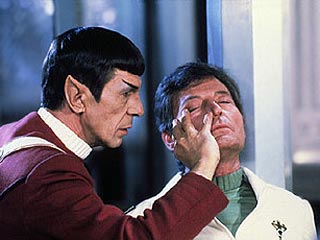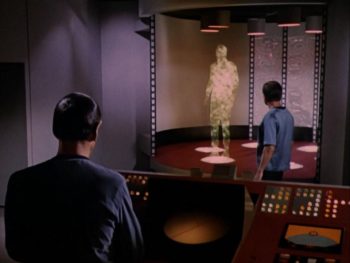The Car-Universe Without A Motor, part 11: Consciousness
You might think a “philosophical zombie” is your friend that got caught up in the intellectual black hole of a certain type of philosopher (say, Immanuel Kant), never to emerge again as a normal person 😉 . But actually it’s a thought exercise philosophers use to talk about consciousness. “What if we could make a body that appears to be human and does all the things a human does, but does so because it is programmed to do so–and is not actually aware of what it’s doing?” Doesn’t that show that something is truly special about human consciousness?
I actually prefer another kind of thought exercise that I think makes the situation clearer. Let’s say that you locked somebody in a box who only reads English and fed that person questions in Chinese. A computer would be with the person that provides certain mathematical formulas based on Chinese character shapes that allows him or her to print out answers to the questions in Chinese, answers that seem correct to someone who can read Chinese outside the box. Is there a difference between getting the answers right based on the formula (without knowing what either the questions or answers mean) and understanding the questions and answering them based on understanding? If there’s a difference, and it seems obvious to me that there is, then it’s possible for a machine to produce right answers without consciousness–which means being conscious is a special state that is more than just our brains firing neurons in structured ways. It means actual understanding and actual perception of events, not just processing answers.
Note that many neuroscientists hold to the concept of “physicalism” which means that everything about consciousness (and everything else) is explicable by the laws of physics operating in brain function. This is related to the idea of “reductionism,” that everything about our consciousness “reduces down” to brain function that will eventually be understood by science. Which would mean that being conscious being special would amount to an illusion, nothing more than neurons firing on a large scale–whether that makes sense or not. Perhaps you would not be surprised to hear that scientists who think this way are often atheists.
But not all scientists take this approach, not even all atheists. And while philosophers tend to oppose scientists in supporting the idea that something is special about consciousness, not all do. And how consciousness is special has many different versions. Some philosophers and scientists (including Thomas Nagel) have even in essence supported Eastern religious notions in maintaining that every bit of matter in the universe “must” have consciousness to explain where consciousness came from.
This debate over consciousness is a real one between and among neuroscientists and philosophers. This is true even though debating the existence of God is not at the center of mainstream academic discourse anymore. It’s true even though the common scientific assumption is now that the universe generated itself out of nothing somehow (perhaps by trying over and over and over in a multiverse until one came out right)–and even though the origin of life from non-life is commonly accepted as explained (though it isn’t). In academia, the reality of being aware of the world is a different category. Even many scientists who are otherwise wholly dedicated to a material universe weigh in differently on what is called “the hard problem of consciousness.” The hard question being, why does consciousness exist in the first place?
Star Trek, one of my favorite science fiction fandoms, makes contradictory approaches as to what consciousness is. When discussing Data or the holographic doctor on Voyager, Star Trek tends to assume that consciousness is an emergent property, that a sufficiently complex system will simply generate self-awareness, just because it is complex enough. Which some philosophers and scientists agree is possible, but a great many think is nonsense.

Spock transfers his katra to Dr. McCoy. (Source: Memory Alpha)
Yet in the Star Trek movies Wrath of Khan and Search for Spock, Spock transfers his consciousness or katra/soul to Dr. McCoy before he dies, or at least makes a copy of his inner self and transfers it (which would perhaps make him a philosophical zombie when he was saying goodbye to Captain Kirk, though nobody I know ever talks about that 🙂 ), only to have it later united to a new body generated for him. This entire idea requires consciousness to be separate from the complex physical structure from which it is thought to have emerged, or else it would not be transferable. And if a consciousness is separate from physical structure, then consciousness would not exclusively be an emergent property of a sufficiently complex system.
Star Trek has even had characters wonder if the soul comes with a body taken apart and reassembled in a transporter beam. Usually this concern is played down, as if “of course” all there is to a human, including consciousness, is automatically in the body and so thus is automatically sent by the transporter. But what if, as happened several times in Star Trek, a transporter accident made two copies of you?

The two versions of Riker, William and Thomas. (Source: Memory Alpha).
Which of these copies would “you” be in terms of your point of view? Not really talking a soul here–if the two versions of you stood on the right and the left of each other, which direction would your experience of looking come from? If you suggest you’d see from both sides at once because the bodies are the same, that isn’t the experience of identical twins, is it?
Or let’s say you had a machine like a transporter, but it could copy human beings or other intelligent life. You step on the pad for it to scan you (which it does without dissembling you), then step down again. The machine cranks out a copy on the pad where you just were and you watch it exit the room. Doesn’t it seem intuitively obvious that your consciousness would stay with you and would not go out of the room with the copy that just left?

Transporting in a new copy. (Source: Forbes)
But what if the copy-machine-transporter actually had to kill you to in order to make copies? Then what would step off the pad, even if exactly like you in every way, in a brain with all the same complex structures as your own, would be something you are not aware of, right? Your conscious awareness in the place where you were would cease to exist. Even if your body (and other consciousnesses) were reproduced in ten new copies right after you were gone.
That means if a transporter takes you apart before assembling you again in another place, your consciousness would presumably end and would not go to the other location. Unless you really do have a soul/spirit that’s linked to your consciousness, which the transporter beam would somehow be able to send along with the body.
So even just talking about a human being’s self-aware point of view, without specifically talking about a soul or spirit, human consciousness has a strange property of providing a conscious point of view that does not transfer just because you can reproduce its structure. Which suggests consciousness is unique, that it’s more than just a product of brain function.
So if we imagine the universe to have generated itself as atheists do, where did consciousness come from? To say that it’s a property emergent from a physical structure that’s complex enough seems insufficient, because it fails to explain the results of a few simple thought experiments. To maintain that it “reduces down” to nothing but brain structure and therefore is not really special denies the actual reality of being self-aware. To on the other hand claim that all matter is already conscious is not only counter-intuitive concerning how inanimate objects act, it’s quasi-religious in a way I imagine most atheists would immediately reject.
Atheists are either left with adopting “mysterianism” which means believing the hard problem of consciousness is too hard for us human beings to solve, so we should stop worrying about it (which seems unscientific to me), or in effect arguing against consciousness being a special state. Which amounts to being in denial of human daily experience and a whole set of rational thinking.
If I propose a different kind of mysterianism, that there’s a mystery in the nature of God that’s too complex for us to solve, I do introduce an extra element into the discussion of origins, but that extra element reduces the amount of mysterious and inexplicable ideas to one. Instead of separate mysteries of the origin of physical matter and the laws of physics, the mystery of the highly improbable low-entropy state of the early universe, the mysteries of dark matter and dark energy, the mystery of the origin of life, and the mystery of consciousness, monotheism proposes just one mystery–God.
Or in the analogy used throughout this series, is it really simpler to imagine a car without a motor climbing hill after hill on its own just because that kind of car has fewer parts? Or is it simpler to imagine an extra part, a motor, that provides a single explanation of how each hill was climbed?
The Creator is that single thing, like a motor in the analogy, that makes the universe make more sense with God than it would without God.
God is specifically shown to be the origin of consciousness in the Bible. Adam’s body was first formed out of the dust of the earth (i.e. physical elements) but then made animate with consciousness–or as the Bible relates, God breathed into Adam the “breath of life” and he became a living being (or in some translations, “living soul”). Genesis 2:7.
Or in Star Trek terms, God put a katra into Adam, who then became more than just a body. He became self-aware. Conscious.
This series of posts is winding to a close, with just one more planned part left. Please share your thoughts on the the topic of consciousness–or on Star Trek‘s use of katras or other similar notions in science fiction or on the use of transporters or anything else that comes to mind–in the comments below.









































